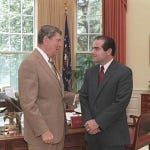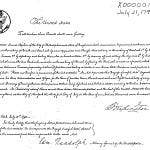This Day in Legal History: Lochner
On April 17, 1905, the U.S. Supreme Court decided Lochner v. New York, a landmark case in American constitutional law that struck down a New York law limiting bakery workers to a 60-hour workweek and 10-hour workday. The Court ruled in a 5-4 decision that the law violated the Fourteenth Amendment's Due Process Clause by interfering with the freedom of contract between employers and employees. Justice Rufus Peckham, writing for the majority, held that the state had overreached its police powers because the law did not have a sufficient connection to health or safety.
This decision launched what is known as the “Lochner era,” a period lasting into the 1930s during which the Supreme Court routinely struck down economic regulations on the basis that they infringed upon economic liberties. Critics of the ruling saw it as judicial activism favoring corporate interests over workers' rights, while supporters viewed it as a defense of individual liberty and limited government.
Justice Oliver Wendell Holmes Jr. wrote a famous dissent, arguing that the Constitution does not enshrine any particular economic theory and warning against the Court imposing its own views on legislation. His dissent later became influential in shaping modern constitutional jurisprudence.
The Lochner decision has since been largely discredited and is no longer considered good law, but it remains a critical case in debates over substantive due process, judicial restraint, and economic regulation.
Google is facing a class action lawsuit in the UK that could result in damages of up to £5 billion ($6.6 billion), alleging it abused its dominant position in the online search market. Filed with the Competition Appeal Tribunal, the case argues that Google’s control of the search engine landscape allowed it to inflate advertising prices. The suit claims Google secured exclusive deals with phone manufacturers and Apple to make its search engine the default option, effectively excluding competitors.
The claim also alleges Google offered better functionality and features for its own ads, making it harder for rivals to compete. Led by competition law expert Or Brook, the suit represents thousands of businesses who argue they had no real alternative to using Google Ads. Brook emphasized that visibility on Google is critical for businesses, calling its control a form of monopoly power.
Google rejected the allegations as speculative and said it would fight the lawsuit, maintaining that users and advertisers choose its services because they are effective, not because they are forced to. Meanwhile, the UK’s Competition and Markets Authority launched a separate investigation into Google’s practices earlier this year, citing its dominant role in UK search and advertising markets.
Google faces 5 billion pound UK lawsuit for abusing dominance in online search | Reuters
The Associated Press (AP) has accused the Trump White House of ignoring a court order that reinstated the news agency’s access to press events. The dispute centers around a federal judge's finding that the AP was unlawfully retaliated against for refusing to use the term “Gulf of America” in place of the historically recognized “Gulf of Mexico” in its reporting, as requested by President Trump. U.S. District Judge Trevor McFadden ruled that the White House likely violated the AP's First Amendment rights and ordered that access restrictions be lifted while the case proceeds.
Despite this, AP lawyers say the White House continues to exclude its journalists from the press pool, including access to the Oval Office and presidential travel. In response, the White House implemented a new policy removing all wire services, including AP, Reuters, and Bloomberg, from permanent pool status, placing them instead in a rotating system with about 30 other outlets. The AP claims this is a veiled attempt to continue its exclusion.
Both Reuters and the AP criticized the policy, noting that many media outlets, especially smaller and international ones, depend on wire service coverage for timely updates on presidential actions. The White House has appealed Judge McFadden’s ruling, with arguments scheduled before a federal appellate court.
AP accuses Trump White House of defying court order restoring access | Reuters
The California attorney general's office has declined to support Elon Musk’s lawsuit against OpenAI, stating in a public letter that the legal action doesn’t appear to serve the state’s public interest. Musk, who co-founded OpenAI but later left, accuses the company and CEO Sam Altman of abandoning its nonprofit mission in favor of profit. He urged the state to join his lawsuit, arguing the transition to a for-profit model undermines the original intent of the organization.
The attorney general’s office responded that Musk hadn’t demonstrated how the lawsuit would benefit the public and raised concerns that he may be trying to control OpenAI’s assets for personal gain. This comes after Musk’s consortium offered an unsolicited $97 billion bid for the company earlier this year. Musk’s legal team pushed back, claiming the state misunderstood his intentions and noting support from former OpenAI employees and philanthropic leaders who oppose the company’s restructuring.
OpenAI, which is still legally a nonprofit in California, must get approval from the state for its planned governance changes. The company says the changes are essential to secure $40 billion in investment and that the nonprofit will retain a stake in the for-profit entity, helping it fulfill its mission long-term.
Musk filed his lawsuit in 2024, asserting OpenAI had strayed from its founding purpose of developing AI to benefit humanity. A jury trial is scheduled for next year. Meanwhile, Musk has launched a competing AI firm, xAI, and Altman has accused him of trying to sabotage a rival.
California attorney general declines to join Musk's lawsuit against OpenAI | Reuters














Share this post